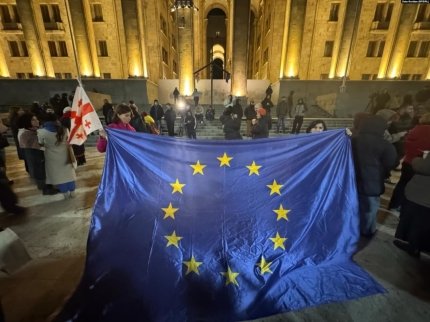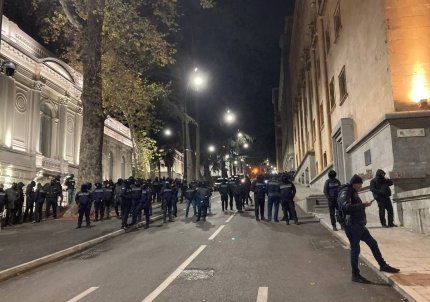In the evening of November 28, a spontaneous rally gathered near the central office of the ruling party "Georgian Dream" in Tbilisi. The reason was the statement of Prime Minister Irakli Kobakhidze about the refusal of the Georgian authorities from negotiations on joining the European Union.
Points of attention
- Massive protests have resumed in Georgia following the government's announcement of abandoning negotiations on joining the EU until 2028.
- Protesters argue that the decision to reject European integration is a betrayal of national interests and undermines years of efforts towards closer ties with Europe.
- The protests highlight the growing discontent among the citizens of Georgia and the perceived threat that the government's stance poses to the country's future.
- The Georgian Prime Minister's assurance to join the EU in 2030 with a strong economy and democratic system is met with skepticism and criticism from the protesters.
- The situation in Georgia remains tense as President Zurabishvili holds emergency consultations with diplomatic corps while security forces gather under the parliament amidst escalating protests.
Mass protests began in Tbilisi: what is known
The participants of the action claim that this decision is a betrayal of the country's interests and a violation of Article 78 of the Constitution of Georgia, which enshrines the desire for EU integration.
According to them, such actions endanger the future of Georgia and destroy years of efforts to get closer to Europe.
The protest was organized through social networks. Part of the protesters also gathered near the Georgian Parliament building on Rustaveli Avenue.

At the same time, the President of Georgia, Salome Zurabishvili, is holding emergency consultations with the diplomatic corps, after which she will issue a statement.

The pro-Russian government of Georgia is already gathering hundreds of security forces under the parliament.
The number of protesters in the capital of Georgia is growing.
The Georgian government has changed its mind about joining the EU
Georgian Prime Minister Iraklii Kobakhidze announced on November 28 that the country is abandoning negotiations on joining the European Union until 2028.
Kobakhidze assured that the issue of opening negotiations with the European Union will not be on the agenda in Georgia at the end of 2028.
Also, until the end of 2028, we will refuse any budget subsidies from the European Union. The end of 2028 is the time when Georgia will be ready, properly prepared from an economic point of view, to start negotiations on joining the European Union in 2030.
He added that Georgia is not going to join the EU "begging and standing on one leg". According to the prime minister, the country wants to join the bloc "with dignity, with a healthy democratic system and a strong economy."




